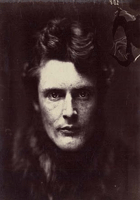Death In A Ball-Room Poem by Wilfrid Scawen Blunt
Death In A Ball-Room
Oh many, many thus have died, alas,
Children, poor things! The grave will have its prey.
Some flowers must still be mown down with the grass,
And in life's wild quadrille the dancers gay
Must trample here and there a weak one in their way.
Yes, thus it is. After the day the night,
A night that has no waking. Who shall tell?
A joyous crowd sits down to feast aright,
But always some one guest, where all seemed well,
Gets up and leaves his chair and hears the passing bell.
I have seen many go; cheeks rosy pink,
And blue eyes wide as if entranced with song,
And forms so frail it seemed that on death's brink
A bird had bent the branch to which it clung,
So frail the body was, the tyrant soul so strong.
One knew I who in her delirium
Uttered a name which troubled all around,
And then, like a lost chaunt for ever dumb,
She left us, smiling. In her breast we found
Some faded violets hid, by a blue ribbon bound.
Poor flowers, poor souls, and only born to die;
Fair fledglings torn untimely from their nest;
Halcyons our Earth had borrowed from the sky
For one short Spring, and then, as if confessed
Unworthy that high charge, given back to Heaven's breast.
Such have I known; and such, alas was one
Whom now I picture sadly here. Her eyes
Had gleams where April's fitful beauty shone.
I know not why she heaved so many sighs.
She was sixteen, perhaps, and cared not to be wise.
Yet think not it was love that was her death.
Love had no song for her of any tone.
Her heart had never beat too fast for brerth.
Though all men called her pretty, there was none
To whisper that soft fable in her ear alone.
No. It was dancing, dancing which she loved
Beyond all else, that caused her thus to die.
Her very dust, methinks, by night is moved
When the pale moon beneath heaven's canopy
Holds revel with the clouds in the quick--circling sky.
Balls she adored. Each evening that she danced
She thought three days and dreamed three nights of it,
And visions brave where goblin partners pranced
Beset her pillows, till she could not sit
Still in her bed but she must rise and dance a bit.
By night and day her fancy framed the sight
Of scarves and flowers and ribbons bright as noon,
And jewels gleaming with unearthly light,
And skirts of gossamer in wild festoon,
And lace like spiders' webs of spiders in the moon.
When the ball opened, she was first to come
With her proud father, honest gentleman.
Like a little mouse she ran about the room.
Oh how she frowned and rattled with her fan
And beat her pretty foot, until the dance began!
It did us good to see her dance. Her feet
Twinkled like stars in a dark firmament.
They moved so fast they made our pulses beat
Lest those frail laces should be overspent
And the white satin shoes be whirled away or rent.
She was all movement, laughter, and mad joy.
Child! How we followed her with our sad eyes,
Forgetful of the fever and annoy
And rush and dust and nameless miseries,
The punishment of souls too proud or sad or wise.
But she, borne off upon her pleasure's wing,
Whirled round and round. She never stopped for breath.
She seemed to drink the fiddler's fiddling in.
She seemed to smell the flowers of every wreath,
To dance with every step the dancers danced beneath.
'Twas joy to her to leap and bound along,
To feel as though she had a thousand feet,
To grow so giddy in the turning throng
She knew not where she was. Her heart so beat
She could not see the chairs to find herself a seat.
Alas, alas that ever morn should come
On such sweet nights! Alas that she must stand
Those hours of woe in the chill waiting room.
Oh, often ere the coach was at command,
The dawn had touched her shoulders with its naked hand.
'Tis ever a sad waking the next day.
No laughter now, but only a dull cough.
The crumpled dresses have been put away.
Pleasure is dead, and there stands Pleasure's scoff,
Fever with cheeks all red and tongue all white and rough.
She died at sixteen, happy, loved by all.
Died as she left off dancing. All of us
Wore mourning long in token of that ball.
She died upon the threshold of the house
In her white robe and wreath and sable--lined burnous.
Death took her thus that she might ever be
Dressed for new dancing. When she wakes again
She shall be ready for Eternity,
And, if in Heaven such raptures are not vain,
Shall tread fair measures still to seraph angels' strain.
This poem has not been translated into any other language yet.
I would like to translate this poem